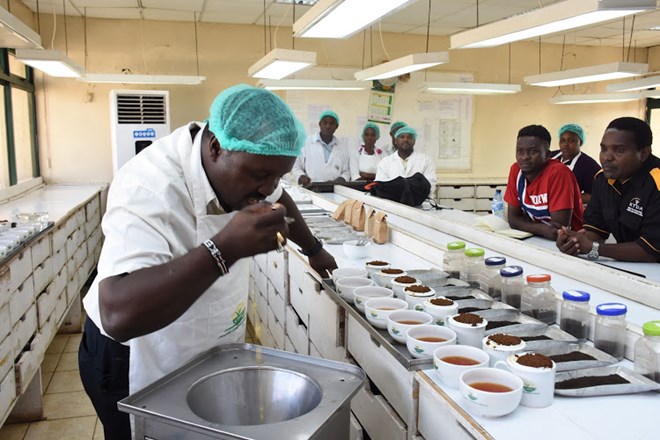
By MARTIN MWITA
Saturday August 22, 2020

Chai Trading Company general manager in charge of trading Francis Muthamia testing tea samples at the company's Miritini facility/FILE
Auction prices for tea have recorded an increase for a straight fourth week, recovering from a 13-year low reported in the period ended June.
The commodity has been gaining week-on-week despite remaining below the two-dollar mark, giving hope for better earnings to farmers in the second half of the year.
This week, a kilo at the Mombasa Tea Auction traded at an average $1.95 (Sh210.74) up from $1.88 (Sh203.17) last week.
Previous two weeks had average prices of $1.85(Sh199.93) and $1.82(Sh196.69) a kilo respectively.
This week's rise came amid a drop in traded volumes, which fell to 7.2 million kilos from last week's 8.1 million kilos, an 837,598 kilos difference.Out of 136,681 packages (9,009,501 kilos) available for sale, 109,180 packages (7,235,036 kgs) were sold. 20.12 per cent packages remained unsold, the East African Tea Trade Association (EATTA) data indicates.
“Kazakhstan and other CIS states lent strong support and were dominant with increased and strong inquiry from Pakistan Packers,”EATTA managing director Edward Mudibo notes.
There was also strong interest from Afghanistan and Sudan while Yemen, other Middle Eastern countries and Russia showed useful activity, EATTA says in its report.
Egyptian Packers were active but at lower levels while UK were active but selective with Bazaar selective. Iran were quieter with reduced support from Local Packers. Somalia were active at the lower end on the market.
The upward trend comes as a relief after three straight weeks of trading at an average $1.73 (Sh186.96), with price depreciation meaning low earnings for farmers.
EATTA is hoping the commodity will go back to above the two-dollar mark in the next few weeks.
It has traded below two dollars for 16 consecutive weeks.
“Anything below two dollars is not good but we are confident the prices will improve soon,” Mudibo told the Star on telephone.
Low prices have been pegged on over-production and supply of green leaf in the wake of favourable weather conditions, with depressed export market affecting buyer decisions.
On the onset of the Covid-19 pandemic, buyers also stocked their warehouses for fear of a supply cut, EATTA notes, a move that has slowed buying of new stocks, hence the low price margins.
Last month, the Kenya Tea Development Agency (KTDA) Holdings announced green leaf production by its affiliate factories grew by 28.5 per cent for the year ended June 30, 2020.
This is a record high total production of 1.448 billion kilograms, up from 1.127 billion kilos the previous year.
The growth is attributed to continued favourable weather across tea-growing regions, improved crop husbandry practices among tea farmers and resumption of crop by farmers who had moved to privately owned tea factories.